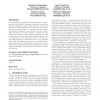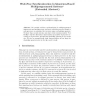14783 search results - page 15 / 2957 » Quantum Information Processing |
120
click to vote
ICQNM
2008
IEEE
15 years 6 months ago
2008
IEEE
—We study a protocol in which many parties use quantum communication to transfer a shared state to a receiver without communicating with each other. This protocol is a multiparty...
124
click to vote
COCO
2005
Springer
15 years 5 months ago
2005
Springer
Consider a two-party quantum communication protocol for computing some function f : {0, 1}n × {0, 1}n → Z. We show that the first message of P can be compressed to O(k) classi...
100
click to vote
CIKM
2010
Springer
14 years 10 months ago
2010
Springer
The probabilistic formalism of quantum physics is said to provide a sound basis for building a principled information retrieval framework. Such a framework can be based on the not...
WDAG
1998
Springer
15 years 3 months ago
1998
Springer
d Abstract) James H. Anderson, Rohit Jain, and David Ott Department of Computer Science University of North Carolina at Chapel Hill We consider wait-free synchronization in multipr...
102
click to vote
WDAG
2010
Springer
14 years 10 months ago
2010
Springer
We present a scalable quantum algorithm to solve binary consensus in a system of n crash-prone quantum processes. The algorithm works in O(polylog n) time sending O(n polylog n) qu...


